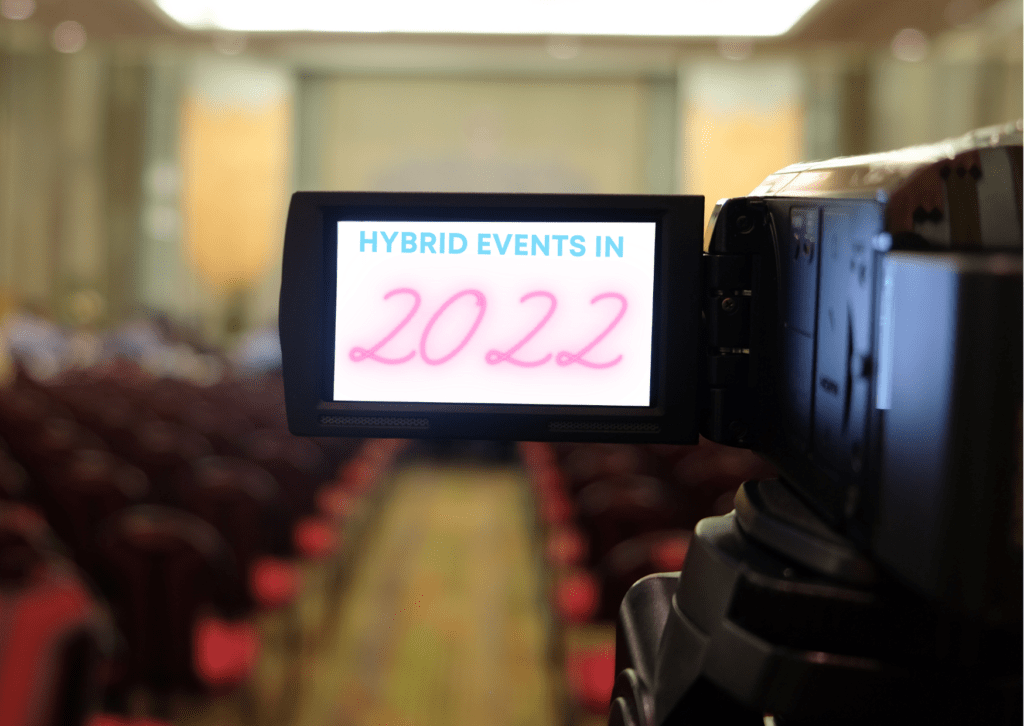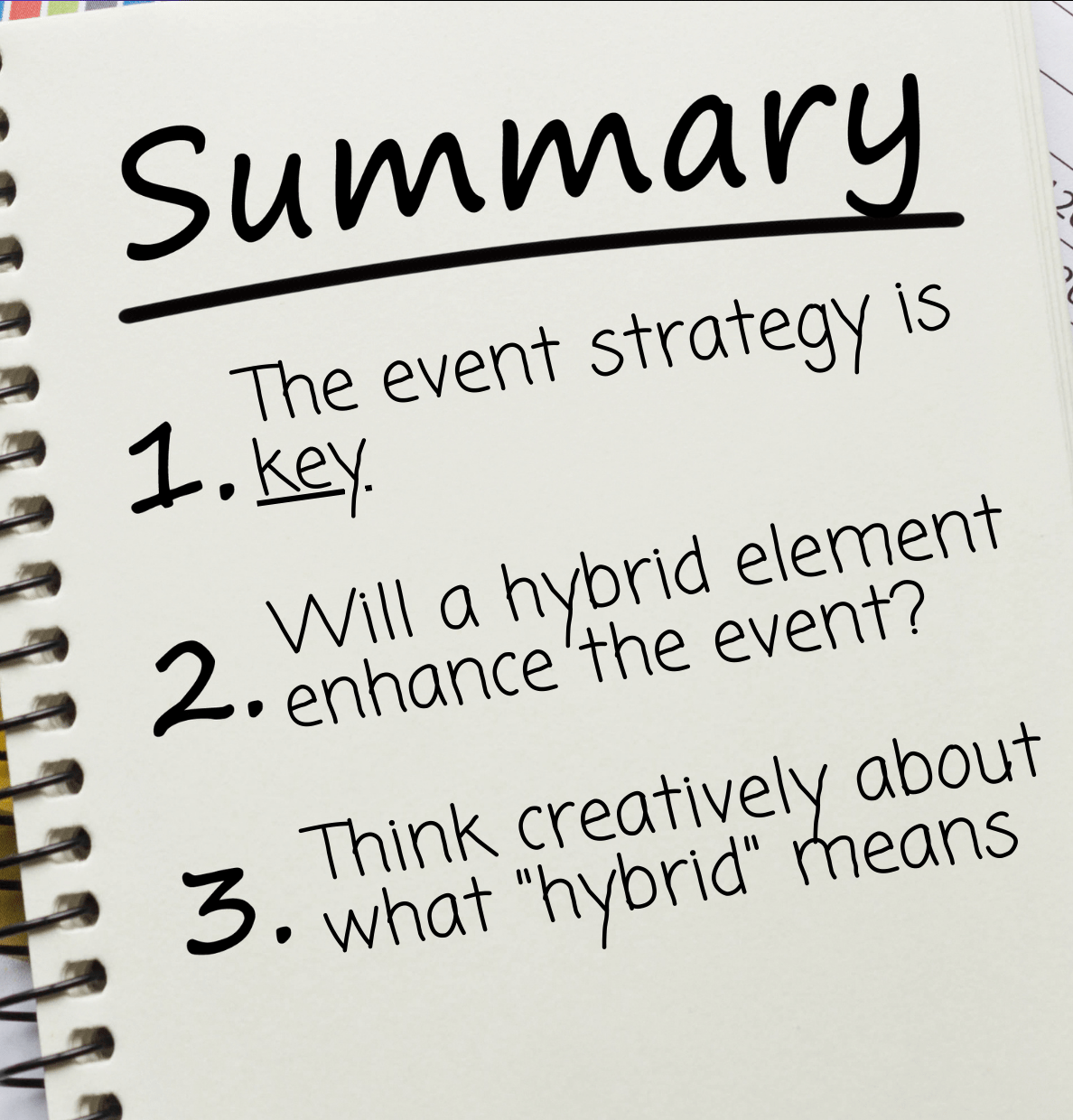
Jenny Elliot,
Head of Events, Fitwise Management Ltd.
This blog is a follow up to ‘Hybrid Event Myth Busting’ (May 2021).
Let us take you back to April 2021. As if in tune with the season, the first shoots of hope were starting to surface within the conference sector. We were optimistic and apprehensive in equal measure; could physical events be a possibility again?
Thankfully, 2021 did see the return of some physical events but with so many uncertainties, a tentative approach which offered choice and flexibility was the logical way forward – and so ‘hybrid events’ became the norm for 2021.

Almost a year on and the landscape has changed again. What worked in 2021 is unlikely to work in 2022. As we stated in the original blog, 2021 was about delivering an event which met the needs of the attendees in whatever form made sense, we were all in a state of flux, after
all. But time has moved on and so must our understanding of how we deliver educational events.
WHAT IS A HYBRID EVENT?
To keep it simple, at Fitwise we define a hybrid event as ‘a physical event with an online presence’. But the possibilities around the ‘online presence’ are endless and can apply to lots of different elements of an event. That’s a whole other discussion.

WHAT IS NOT A HYBRID EVENT?
While the above definition is conveniently open to interpretation, at Fitwise we are very clear about what a hybrid event is not. It is not (or at least very unlikely to be) a physical event with an adjacent virtual event. Particularly in the association market, the financial implications and resource requirements make this concept unachievable and, above all, unnecessary.
SOUND FAMILIAR?

“Should we offer online only delegate access? What do we define as an ‘online’ delegate? Will online delegates access be ‘live’ or ‘on-demand’? Do online delegates need to have attended in person to gain online access? Do we offer online access as catch-up TV/on demand instead of a live interactive stream? Do we charge for online delegates? What rate is suitable for an online delegate? How much of the event does a virtual delegate have access to? What will make a delegate attend in person rather than online? What are the advantages of attending in person? Will online only delegates have a delayed access and for what period? If we want to widen our audience, where are they located? Are there international delegates who wouldn’t have attended in person but would attend online? Should we restrict online access to international delegates only? Do we want to keep a permanent recording of the event? We haven’t even discussed other aspects of what an online presence could be! What about speakers, can we pre-record or livestream speakers? Will this enrich the programme content?”

IT’S OK TO BUCK THE TREND
Brace yourselves…
Offering a virtual delegate attendance option can negatively affect your in-person attendee numbers. There, we said it.
That’s not to say it’s a bad idea, but it does highlight the importance of thinking through the different options available and the implications of each. The format must fundamentally meet the aims and objectives of your event. Viewing ‘hybrid’ as a strategy rather than merely part of the conference offering is essential. This change in mind-set can be liberating for clients caught in the fog of planning a hybrid conference.
There is a definite pressure for conference organisers to offer virtual attendance in 2022 because there’s a perception that everyone is doing it. The fear is, if you don’t allow online delegate access, will your event be viewed as behind-the-times, inferior or non-inclusive?
There are lots of reasons to allow virtual delegates (e.g. to widen your audience reach or use as a longer-term marketing strategy, especially for associations and membership organisations). But you need to be honest about why you are doing it and what benefits it is likely to bring to your own, unique event. And is the financial investment worth it? Just because everyone else is doing it doesn’t mean it’s right for your event or your delegate contingent.
HYBRID EVENTS EXISTED BEFORE THE PANDEMIC
Most of our clients have held ‘hybrid’ style events for many years, but we now have a colloquial term which is generally understood, even if it is open to fairly wide interpretation.
Whether it be live-streaming, on-demand or post-event access, hybrid events have always been an option in some form. But the normalisation of online meetings as a result of worldwide COVID lockdowns, has empowered clients to embrace such technology, and many can now see the advantages of beefing up the online element of their conferences.
THE PROBLEM WITH GOING VIRTUAL THEN HYBRID
With the legacy of many successful virtual events in 2020 and 2021, delegate and sponsor expectations need to be managed carefully with clear marketing communications. Those who attended the preceding virtual event should not expect the same experience from the online version offered as part of a hybrid format. This is particularly important if an event is offering ‘online only’ delegate registration option. There’s no harm charging a premium to help facilitate an online presence, but delegates need to be clear about what they are getting for their money.
We want the virtual delegates of 2022 to become the in-person delegates of 2023; so impressed were they by the online taster that they log-off with an overwhelming sense of FOMO (fear of missing out) that motivates them to attend in-person in 2023.
HYBRID TOP TIP – THINK HYBRID SPEAKERS
No, we don’t mean projecting a 6ft hologram of a speaker!
Consider hybrid in a wider context and consider including remote speaker presentations.

Consumers in general have become more comfortable with the virtual concept. Use this to your advantage and invite that impactful speaker from the US who you could never afford to fly over for the sake of a 20-minute presentation. Don’t change your programme flow just because a speaker has double booked their diary; just pre-record their session. Don’t stress about your (slightly unreliable) keynote speaker having a last-minute work emergency, simply ask them to pre-record a session which can be used as a back-up plan. Whatever happens, these presentations can go ahead. Why did none of this occur to us pre-pandemic?!
FOOD FOR THOUGHT
Let us summarise…..
Its okay to do something different
- The format must fundamentally meet the aims and objectives of your event. Viewing ‘hybrid’ as a strategy rather than merely part of the conference offering is essential.

- Be honest about why you are doing it and what benefits it is likely to bring to your own, unique event. And is the financial investment worth it
- Consider hybrid in a wider context and consider including remote speaker presentations.
To chat more to Jenny about the options available to your event and the services that Fitwise can offer: Jenny@fitwise.co.uk
